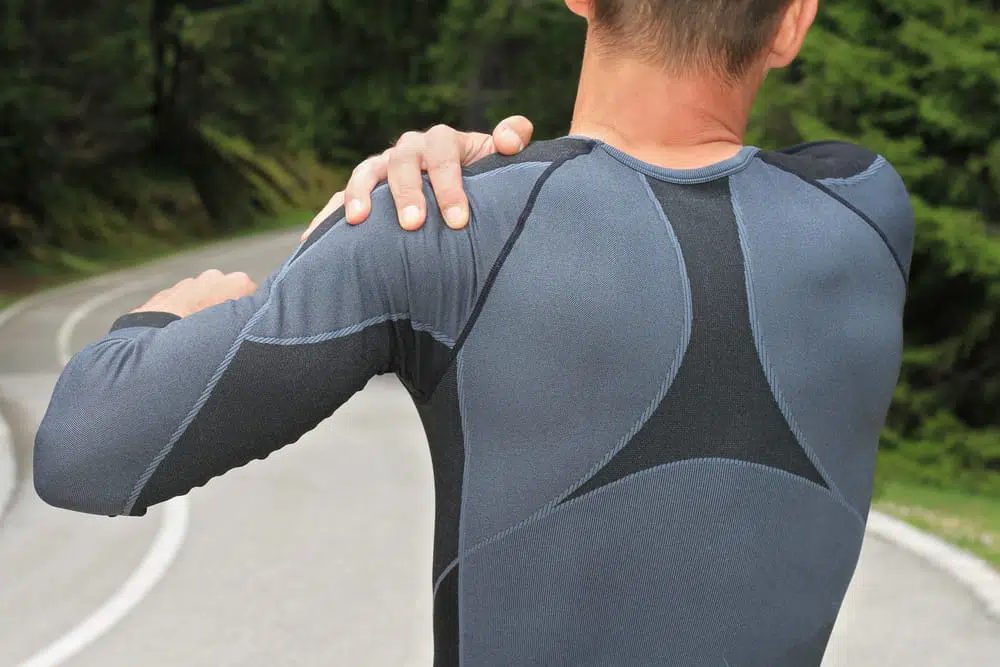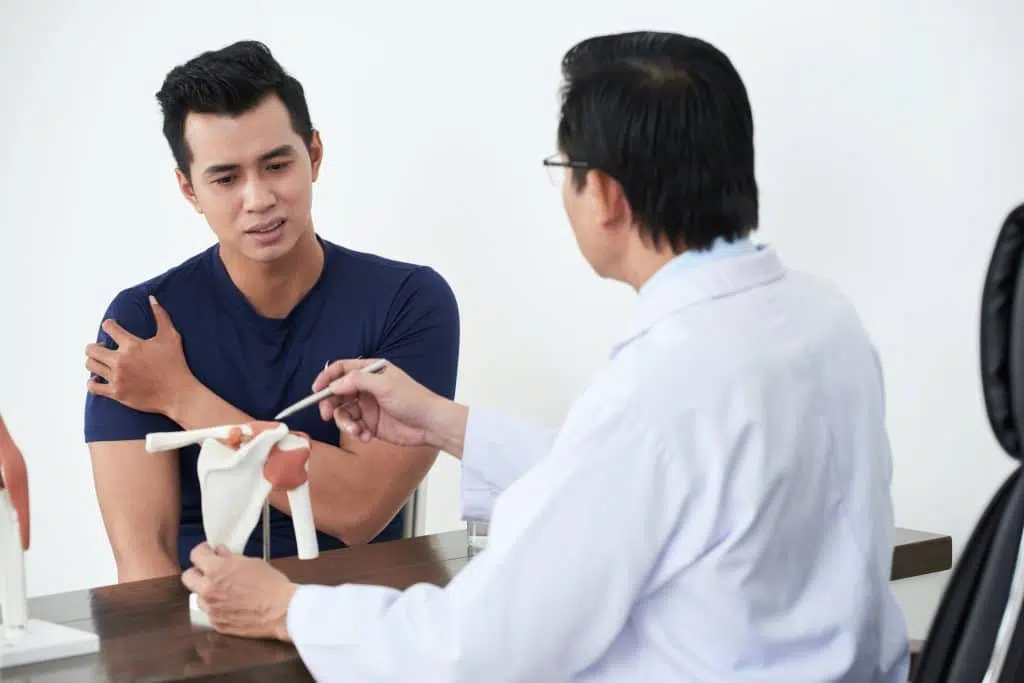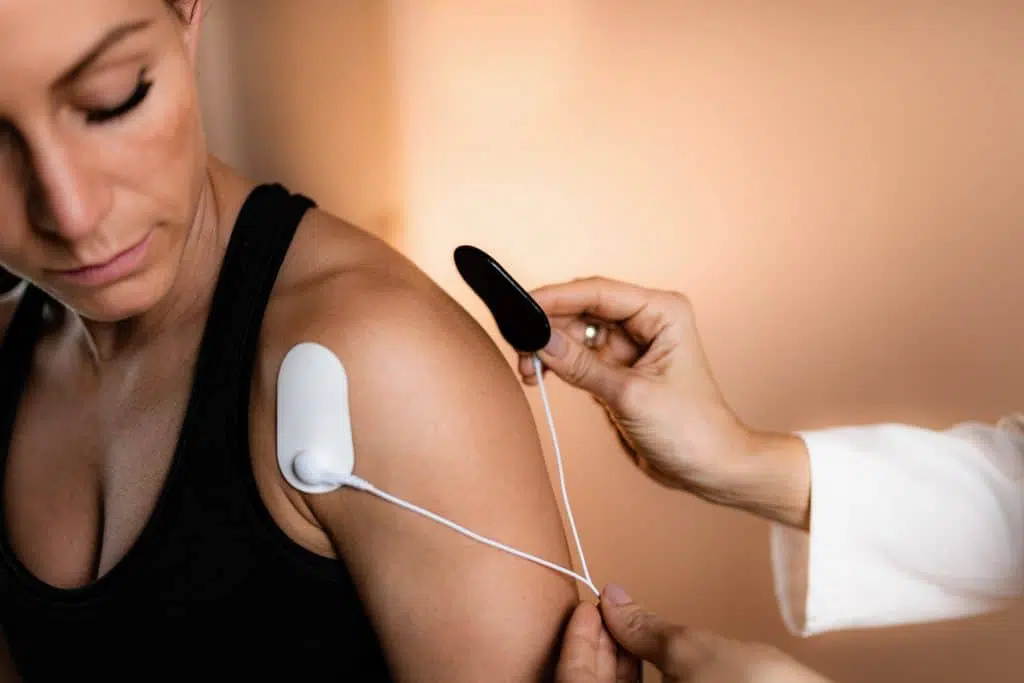Call Now!
Torrance Office: +1 (424) 360-0155

The shoulder is the most mobile joint in the body, providing a wide range of motion and flexibility. The entire shoulder is actually comprised of three bones, several joints, and their surrounding muscles and tendons. The top of the humerus fits into the shallow socket of the shoulder blade, supported by ligaments and rotator cuff muscle to form the main ball and socket joint. Given its complex structure, the shoulder is especially prone to problems and injuries. Our shoulder pain specialists at Rolling Hills Medical in Torrance offer comprehensive diagnosis and treatment of various shoulder conditions.
Due to its involvement in everyday movement and activity, even minimal pain and discomfort can affect everyday tasks. Shoulder problems often cause weakness and pain that limits patients’ ability to work, perform menial tasks, or even sleep. Common shoulder problems include inflammation, instability, arthritis, and fractures. Acute injuries are often caused by traumatic injury or overuse of the shoulder. Common shoulder injuries treated by our orthopedic pain specialists include:
There are for rotator cuff muscles, necessary for maintaining mobility of the shoulder. Rotator cuff injuries involve the tearing of rotator cuff tendons from the bone. Rotator cuff injuries most often occur from repeated overhead motions, including painting, carpeting, and throwing baseballs or tennis balls. The pain is often dull, affecting reaching or overhand movement, though progressive degeneration can lead to permanent weakness and immobility. Treatment often involves rest, physical therapy, or surgery.
The shoulder is the most frequently dislocated major joint in the body. Dislocation involves separation of the top of the humerus from the glenoid, the shoulder joint socket. A dislocated shoulder can be popped back immediately, however, lasting damage to the ligaments often results in instability and repeated injury to the shoulder. Treatment often involves rest to the shoulder, though persistent pain may require steroid injections or surgery.
Shoulder tendonitis involves inflammation of the rotator cuff or bicep, often caused by tendons being pinched by surrounding structures. Shoulder tendonitis is often the result of sports injuries caused by over the head motions involved in baseball, weightlifting, volleyball, and racket sports. Symptoms of shoulder tendonitis involve discomfort, tenderness, and pain.
The labrum is fibrous tissue supporting the ball and socket joint of the shoulder. The ball of the upper humerus is actually larger than the glenoid joint, making the surrounding structures essential for stabilization. Labral tears are caused by repetitive stress or traumatic injury, caused by falling, direct blows, or sudden reaching or lifting. Symptoms of shoulder labral tears often include locking and grinding of the joint, instability, decreased motion, and pain. Treatment often involves non-surgical options, thought minimally invasive arthroscopic procedures may be required.

Arthritis is characterized by pain and swelling of the joints and connective tissue. Shoulder arthritis often results in stiffness and pain, limiting everyday movement. The two most common forms are osteoarthritis and rheumatoid arthritis.
The bursae are fluid-filled sacs that act as cushions between bones, tendons, and muscles surrounding a joint. Bursitis is the inflammation of the bursae that causes limited joint motion, swelling, tenderness, and pain. Shoulder bursitis is often caused by injury or overuse. Treatment for shoulder bursitis may include antibiotics, NSAIDs, steroid injections, or even surgery.
The clavicle, or collar bone, is fairly exposed with minimal protective padding. Collarbone fractures are quite common following traumatic injuries from sports, car accidents, falls, and direct impacts.Collarbone fractures cause swelling, slumping, and pain that may limit normal movement. Our orthopedic specialists offer various treatment options to address pain from collarbone fractures, including non-surgical and surgical options.
Frozen shoulder, also known as adhesive capsulitis, is caused by inflammation of the shoulder joint capsule, the lining that connects the ball to the socket . The joint capsule contains ligaments crucial for stability of the shoulder bones. Inflammation causes severe pain that results in progressive movement loss. Risk factors for frozen shoulder include injury, shoulder or heart surgery, cervical disease. Treatment often begins with non-surgical methods including physical therapy, but may require intervention from an orthopedic surgeon if not conservative methods have proven ineffective.
Non-surgical shoulder pain treatment options include the use of medications, physical therapy, and injections. However, depending on the severity of pain symptoms, surgery may be recommended. Our experienced shoulder specialists work with a collaborative team of physicians, surgeons, and physical therapists to determine the best course of treatment. Common shoulder surgeries and procedures include:
As a leader in advanced orthopedic surgeries, Rolling Hills Medical prefers minimally invasive arthroscopic surgery over traditional surgery. Arthroscopic shoulder surgeries can help treat a range of shoulder conditions including for rotator cuff repair, impingement syndrome, and shoulder instability.
Depending on the extent of rotator cuff damage, surgery may involve open surgery, arthroscopic surgery, or a combination of both.

Restoration may involve advanced orthopedic surgical techniques including;
During total shoulder replacement surgery, the round end of the arm bone along with the socket of the shoulder blade are completely replaced, using metal, plastic, and special cement materials.
Treatment at Rolling Hills Medical includes comprehensive post-surgical rehabilitation. Our orthopedic specialists and physical therapists develop a program involving gentle stretching and exercise to restore range of motion.
Our orthopedic specialists at Rolling Hills Medical are experts in their field, using advanced diagnostic and treatment techniques. Contact our shoulder specialists today for more information on personalized treatment options for your shoulder condition.
Call us today at (424) 379-5764 for evaluation and treatment.